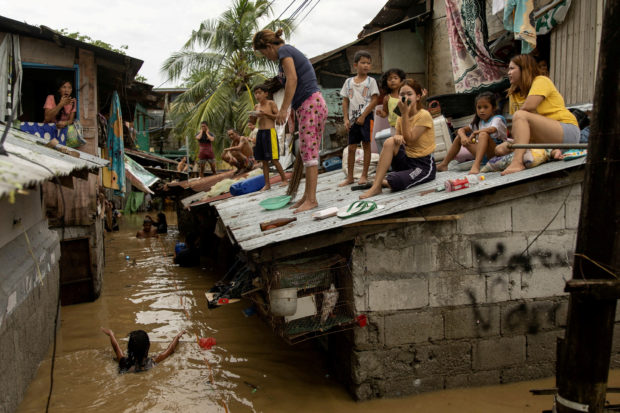
San Miguel, Bulacan residents wait on the roof of their homes for the flooding to subside on September 26, 2022 after Super Typhoon Karding (international name Noru) (File photo from REUTERS/Eloisa Lopez)
MANILA, Philippines — A recent survey of Social Weather Stations (SWS) that found almost half of the respondents rating themselves as poor was held during a period when there were typhoons.
Such a condition was identified by National Economic and Development Authority (Neda) Secretary Arsenio Balisacan in a Palace statement on Thursday.
“We note that the SWS September survey was conducted after a series of typhoons hit the country, which also affected food prices and directly impacted families who lacked the means to cope with the increase in prices,” Balisacan said.
However, he did not specify which typhoons these were or what areas were hit.
READ: SWS survey: 48% of Filipino families rate themselves ‘poor’
The Neda chief also said food inflation could have contributed to the result of the survey.
“Poverty measures based on respondents’ perceptions are sensitive to inflation, particularly for essential commodities,” he said.
“Food inflation in September was higher than in June this year due to the supply disruptions,” he recalled.
READ: SWS survey: 48% of Filipino families rate themselves ‘poor’
Balisacan said the government is taking measures to minimize poverty.
He cited the food stamps distributed by the Department of Social Welfare and Development (DSWD).
SWS reported that 49 percent of Filipino families covered by its survey considered themselves poor.
READ: More Filipino families consider themselves food poor in Q1 of 2023 — SWS
The agency also observed an increase in self-rated poverty in all areas except Balance Luzon, or the places just outside the National Capital Region.
In a separate statement, Social Welfare Secretary Rex Gatchalian said the government was looking into ways to ease poverty before the survey took place.
“This is the reason why the DSWD came up with the Food Stamp Program, which was designed primarily to alleviate the lingering incidence of food poverty and malnutrition among low-income Filipino households, through the provision of meal augmentation worth PHP 3,000 on a monthly basis,” Gatchalian said.